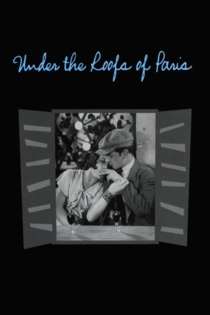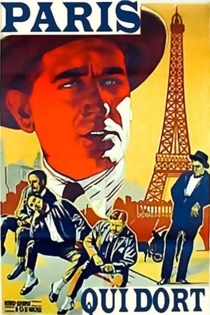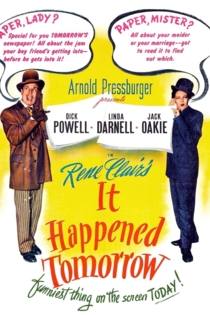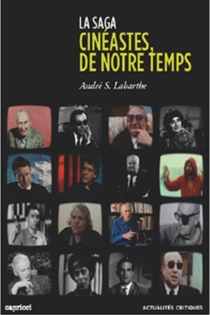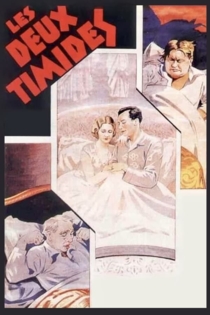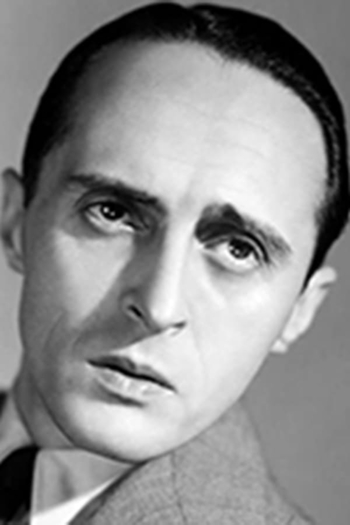
René Clair
1898 - 1981In 1924, while Clair was working on Ciné-sketch for the theatre with France Picabia, he first met a young actress, Bronja Perlmutter, who subsequently appeared in his film Le Voyage imaginaire (1926) premiered at the newly opened Studio des Ursulines. They married in 1926, and their son, Jean-François, was born in 1927.
René Clair died at home on 15 March 1981, and he was buried privately at Saint-Germain-l'Auxerrois.
Clair's reputation as a film-maker underwent a considerable reevaluation during the course of his own lifetime: in the 1930s he was widely seen as one of France's greatest directors, alongside Renoir and Carné, but thereafter his work's artifice and detachment from the realities of life fell increasingly from favour. The avant-gardism of his first films, and especially Entr'acte, had given him a temporary notoriety, and a grounding in surrealism continued to underlie much of his comedy work. It was however the imaginative manner in which he overcame his initial scepticism about the arrival of sound which established his originality, and his first four sound films brought him international fame.
Clair's years of working in the UK and USA made him still more widely known but did not show any marked development in his style or thematic concerns. It was in the post-war films that he made on his return to France that some critics have observed a new maturity and emotional depth, accompanied by a prevailing sense of melancholy but still framed by the elegance and wit that characterised his earlier work.
However, in the 1950s the critics who heralded the arrival of the French New Wave, especially those associated with Cahiers du Cinéma, found Clair's work old-fashioned and academic. The paradox of Clair's reputation has been further heightened by those commentators who have seen François Truffaut as the French cinema's true successor to Clair, notwithstanding the occasions of their mutual disdain.
À nous la liberté
René Clair
Henri Marchand, Raymond Cordy
In this classic French satire, Louis, a convict, escapes from prison and takes on legitimate work, making his way up in the business world. Eventually becoming the head of a successful factory, Louis opts to modernize his company with mechanical innovations. But when his friend Émile finally leaves jail years later and reunites with Louis, the past catches up with them. The two, worried about being apprehended by police, long to flee the confines of industry.
À Nous la Liberté
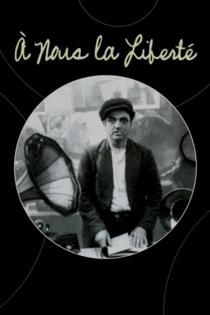
La Beauté du diable
René Clair
Michel Simon, Gérard Philipe
Henri Faust, retiring after 50 years as a professor in a circa-1700 French university, despairs at the ravages of old age ... whereupon Mephistopheles, agent of Lucifer, appears as a virile, handsome young man and exchanges bodies with him to induce Faust to sign a pact to exchange his soul for renewed youth, riches and power. But though the "new" Faust is attracted by the material improvements in his life, he remains wary of signing, while Mephistopheles, now posing as the aged professor whose body he inhabits, must find a way to trick him into signing the pact - and dissuade him from the love of a gypsy girl who prays for his soul - or find himself damned by his own Master...
The Beauty of the Devil
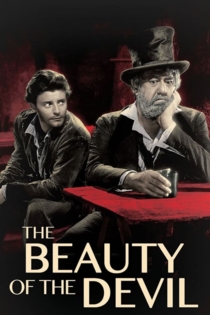
Entr'acte
René Clair
Jean Börlin, Inge Frïss
Stop-motion photography blends with extreme slow-motion in Clair's first and most 'dada' film, composed of a series of zany, interconnected scenes. We witness a rooftop chess match between Marcel Duchamp and Man Ray, a hearse pulled by a camel (and chased by its pallbearers) and a dizzying roller coaster finale. A film of contradictions and agreements.
Entr'acte
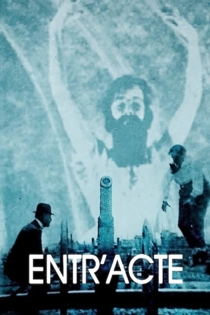
And Then There Were None
René Clair
Barry Fitzgerald, Walter Huston
Ten strangers are summoned to a remote island and while they are waiting for the mysterious host to appear, a recording levels serious accusations at each of the guests. Soon they start being murdered, one by one. As the survivors try to keep their wits, they reach a disturbing conclusion: one of them must be the killer.
And Then There Were None
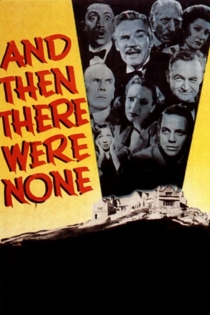
Le million
René Clair
René Lefèvre, Annabella
Debt-ridden painter Michel is overcome with joy at discovering that he has just won 1 million florins in the Dutch lottery, but almost immediately, he discovers that his softhearted girlfriend, Béatrice, has given away his jacket containing the winning ticket to an elderly petty thief. Soon Michel, Beatrice and Michel's artistic rival, Prosper, are hurtling through the streets of Paris on the trail of the missing jacket.
Le Million
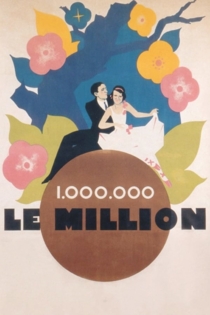
En compagnie de Max Linder
Maud Linder
Max Linder, René Clair
Pioneering comedy legend Max Linder wrote, produced, directed and starred in Seven Years Bad Luck. Hilarious misadventures begin when Max' butler, chasing a maid, breaks an expensive full-length mirror. The butler persuades the cook, who somewhat resembles Max, to stand behind the frame and be Max's reflection. This gag, developed by Max, has become a classic of film and even television borrowed by everyone from the Marx Brothers to Abbott and Costello to Red Skeleton.
Laugh with Max Linder
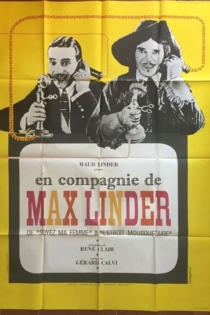
Le silence est d'or
René Clair
Maurice Chevalier, François Périer
Emile is a French film producer at the beginning of the century. One of his friends leaves his daughter Lucette in his house, when he is starting a tour through France. Emile falls in love with her. Problems starts when his younger friend Jacques come back from military service and after complaining his misfortune with women, follows Emile's advice in starting affairs with women and he meets Lucette.
Silence Is Golden
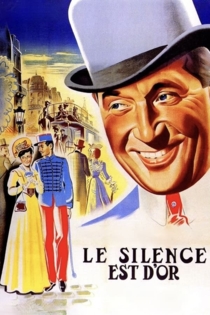
I Married a Witch
René Clair
Fredric March, Veronica Lake
Rocksford, New England, 1672. Puritan witch hunter Jonathan Wooley is cursed after burning a witch at the stake: his descendants will never find happiness in their marriages. At present, politician Wallace Wooley, who is running for state governor, is about to marry his sponsor's daughter.
I Married a Witch
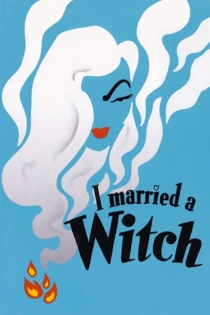
Porte des Lilas
René Clair
Pierre Brasseur, Georges Brassens
Juju, a drunken oaf who feels the need of being important to someone---anyone---and his friend The Artist are forced at gunpoint to house a fugitive, Pierre Barbier, in Juju's broken-down home. The urge for being needed is such in Juju that he gives up drinking and takes care of Pierre. But one day Juju finds out that Pierre has been making love to his girl Maria...
The Gates of Paris
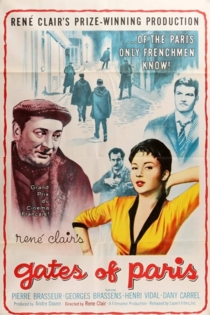
Sous les toits de Paris
René Clair
Albert Préjean, Pola Illéry
In the tenement slums of Paris between the world wars, impoverished street singer Albert yearns for beautiful Romanian immigrant Pola. Pola's boyfriend, local hoodlum Fred, grows jealous of Albert's constant attention to his woman and frames the hapless musician for one of his own petty crimes. But while Albert is in prison for Fred's misdeed, Pola ends up falling for Albert's faithful best friend, Louis.
Under the Roofs of Paris
